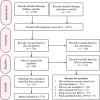Income security during periods of ill health: a scoping review of policies, practice and coverage in low-income and middle-income countries
- PMID: 32540963
- PMCID: PMC7299014
- DOI: 10.1136/bmjgh-2020-002425
Income security during periods of ill health: a scoping review of policies, practice and coverage in low-income and middle-income countries
Abstract
The COVID-19 pandemic is a reminder that insufficient income security in periods of ill health leads to economic hardship for individuals and hampers disease control efforts as people struggle to stay home when sick or advised to observe quarantine. Evidence on income security during periods of ill health is growing but has not previously been reviewed as a full body of work concerning low-income and middle-income countries (LMICs). We performed a scoping review to map the range, features, coverage, protective effects and equity of policies that aim to provide income security for adults whose ill health prevents them from participating in gainful work. A total of 134 studies were included, providing data from 95% of LMICs. However, data across the majority of these countries were severely limited. Collectively the included studies demonstrate that coverage of contributory income-security schemes is low, especially for informal and low-income workers. Meanwhile, non-contributory schemes targeting low-income groups are often not explicitly designed to provide income support in periods of ill health, they can be difficult to access and rarely provide sufficient income support to cover the needs of eligible recipients. While identifying an urgent need for more research on illness-related income security in LMICs, this review concludes that scaling up and diversifying the range of income security interventions is crucial for improving coverage and equity. To achieve these outcomes, illness-related income protection must receive greater recognition in health policy and health financing circles, expanding our understanding of financial hardship beyond direct medical costs.
Keywords: health policy; public health.
© Author(s) (or their employer(s)) 2020. Re-use permitted under CC BY-NC. No commercial re-use. See rights and permissions. Published by BMJ.
Conflict of interest statement
Competing interests: None declared.
Figures




Similar articles
-
Protecting health during COVID-19 and beyond: A global examination of paid sick leave design in 193 countries.Glob Public Health. 2020 Jul;15(7):925-934. doi: 10.1080/17441692.2020.1764076. Epub 2020 May 12. Glob Public Health. 2020. PMID: 32396447
-
Challenges of COVID-19 in children in low- and middle-income countries.Paediatr Respir Rev. 2020 Sep;35:70-74. doi: 10.1016/j.prrv.2020.06.016. Epub 2020 Jun 25. Paediatr Respir Rev. 2020. PMID: 32654854 Free PMC article. Review.
-
Protecting essential health services in low-income and middle-income countries and humanitarian settings while responding to the COVID-19 pandemic.BMJ Glob Health. 2020 Oct;5(10):e003675. doi: 10.1136/bmjgh-2020-003675. BMJ Glob Health. 2020. PMID: 33028701 Free PMC article. Review.
-
Chronic diseases: An added burden to income and expenses of chronically-ill people in Sri Lanka.PLoS One. 2020 Oct 28;15(10):e0239576. doi: 10.1371/journal.pone.0239576. eCollection 2020. PLoS One. 2020. PMID: 33113548 Free PMC article.
-
The impact of COVID-19 on diet quality, food security and nutrition in low and middle income countries: A systematic review of the evidence.Clin Nutr. 2022 Dec;41(12):2955-2964. doi: 10.1016/j.clnu.2021.08.015. Epub 2021 Aug 27. Clin Nutr. 2022. PMID: 34535329 Free PMC article.
Cited by
-
The Effect of COVID-19 on the Kurdistan Region Government (KRG) Economy.J Knowl Econ. 2023 Mar 22:1-16. doi: 10.1007/s13132-023-01130-1. Online ahead of print. J Knowl Econ. 2023. PMID: 40478975 Free PMC article.
-
Household Shocks and Adolescent Well-Being in Peru.Popul Res Policy Rev. 2023;42(3):44. doi: 10.1007/s11113-023-09787-x. Epub 2023 May 16. Popul Res Policy Rev. 2023. PMID: 37214766 Free PMC article.
-
Material Security Scale as a Measurement of Poverty among Key Populations At-Risk for HIV/AIDS in Malaysia: An Implication for People Who Use Drugs and Transgender People during the COVID-19 Pandemic.Int J Environ Res Public Health. 2022 Jul 24;19(15):8997. doi: 10.3390/ijerph19158997. Int J Environ Res Public Health. 2022. PMID: 35897368 Free PMC article.
-
"I'm suffering for food": Food insecurity and access to social protection for TB patients and their households in Cape Town, South Africa.PLoS One. 2022 Apr 26;17(4):e0266356. doi: 10.1371/journal.pone.0266356. eCollection 2022. PLoS One. 2022. PMID: 35472210 Free PMC article.
-
A cross-country analysis of macroeconomic responses to COVID-19 pandemic using Twitter sentiments.PLoS One. 2022 Aug 24;17(8):e0272208. doi: 10.1371/journal.pone.0272208. eCollection 2022. PLoS One. 2022. PMID: 36001531 Free PMC article.
References
-
- United Nations Final list of proposed sustainable Development Goal indicators [online]. United Nations, 2016: 2–25. (accessed 5 March 2019).
-
- WHO Rio political Declaration social determinants of health. Rio de Janeiro, Brazil, 2011: 1–7.
-
- Dahlgren G, Whitehead M. Levelling up (Part 2): a discussion paper on European strategies for tackling social inequities in health. Studies on social and economic determinants of population health. 1, 2006: 2–124.
-
- WHO Together on the road to universal health coverage: A call to action [online. WHO Press, 2017. (accessed 28 April 2019).
Publication types
MeSH terms
LinkOut - more resources
Full Text Sources
